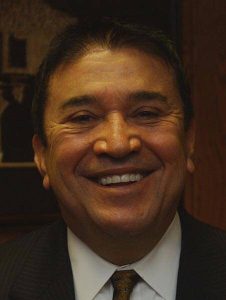
Rio Grande Valley music legend Paulino Bernal has died after a brief battle with cancer. He was 83 years old.
Bernal died at 7:22 p.m. Saturday while surrounded by his wife and children at DHR Health in Edinburg.
“He was surrounded by all of his family. I think you couldn’t have squeezed one more person in that room,” said Yesenia Bernal Saravia, the youngest of Bernal’s six children.
“He took his last breath as we were worshiping and singing all around him. … One of the last songs that we sang together was Cuán Grande Es Él, (How Great Thou Art),” Bernal Saravia said.
The prolific accordionist, music producer, radio personality and pastor succumbed to advanced lung cancer which was diagnosed at a late stage, causing Bernal to deteriorate within a few months of its discovery, his daughter said.
But she took comfort that her father— who famously turned away from a life of drug and alcohol abuse in order to become a dedicated Christian who spread the gospel across Latin America — died listening to the Spanish hymns that had filled his ministry for decades.
“To me, it’s very beautiful because he went peacefully — I want that to be known — and surrounded by those who loved him,” Bernal Saravia said.
“In his last moments, he cried out to Jesus and that was the most beautiful thing I could have ever seen,” she said some minutes later.
Bernal came from humble beginnings.
He was born in Raymondville in 1939 and was raised by a single mother who soon moved her family to Kingsville.
Bernal and his five siblings became farmworkers at a young age, picking cotton and vegetables to support their family.
It was during his childhood in the 1940s and ‘50s that he became enamored with the accordion and some of its greatest Conjunto musicians, such as San Benito’s Narciso Martinez, and Valerio Longoria, who was born in the ranchlands of Kenedy County.
When a childhood friend was gifted an accordion, Bernal was at last introduced to the instrument that would go on to change not only his life, but the history of Latino music.
“We lost not only a legend, but a master and a teacher,” said Frutty Villarreal, of Frutty Villarreal y Los Mavericks.
Villarreal spoke of the unparalleled skill Bernal had with the accordion — a musicality that has no match, even today.
“It was like a symphony, like an orchestra, in just four instruments. … I mean, all those notes that other people have to read, and Paulino was one of those masters. He was playing all those notes, which — not even today — you will never see an accordionist that can play even halfway as complicated as him,” Villarreal said.
“He was just a real pro. … You didn’t have to record it many, many times to get it right,” said Paul Westbrook, a recording engineer who once worked at Discos Falcon recording studio in McAllen.
Westbrook, a Mississippi native, moved to the Rio Grande Valley in the 1970s and recorded Tejano music legends such as Roberto Pulido, Laura Canales, Los Unicos, Lydia Mendoza, Freddie Fender, and his good friend, Carlos Guzman.
He also had the opportunity to record Bernal — but it wasn’t until later that he realized he had been in the presence of a soon-to-be-legend.
“Years later, I came to really appreciate him when I talked to other accordion players and they all said that Paulino was the maestro. He was the best,” Westbrook said.
“When you’re talking to people like Grupo Duelo or Intocable, or these big, big groups that make lots of money and they say those things, it really gets your attention,” he said.
The pair would cross paths several more times over the years, including when Bernal held a milestone birthday bash a few years ago.
Westbook said Bernal came out to greet him and Guzman with a fond remembrance of one recording session in particular — the Spanish canto of “Un Dia a la Vez,” or “One Day at a Time.”
“He came up, he grabbed me and hugged me and told me, ‘I don’t know whether you knew this, but you recorded the biggest hit I ever recorded, that outsold everything,’” Westbrook said of the moment.
Originally written as a country gospel song by Marijohn Wilkin in the early 1970s, Bernal was one of the first musicians to record it in Spanish, his daughter, Bernal Saravia said.
Like much of Bernal’s work, the song has become a mainstay among mariachi troupes.
But while Bernal got his start playing in cantinas and bailes to help support his mother and siblings, the bulk of his musical and professional career was spent sharing the testimony of his faith-inspired transformation.
For the young Paulino Bernal, the allure of his quickly rising musical notoriety had begun to lead him down the wrong path. He used alcohol and drugs.
Soon enough, Maria — the woman he had married when he was 19 years old and she was 24 — gave him an ultimatum: change, or the marriage is over.
“They were about to get divorced,” Bernal Saravia said.
“My mother came home and said, ‘I just don’t want to live this life anymore.’ … Either you keep on with that, or you change.’”
Bernal chose to change. And his marriage to Maria lasted 63 years.
Bernal changed by following in the footsteps of his wife and son, Paulino Jr. in accepting Jesus Christ as his savior.
“The change was so drastic. He went from being famous in the secular world and he could have, he could have gone up and up and up and his life changed,” Bernal Saravia said.
From that moment on, Bernal dedicated his life to Christianity and to spreading the message of salvation.
He would go on to found an international evangelical ministry with a home base at Valley Worship Center in McAllen.
In the decades that followed, Bernal built an empire.
Bernal founded La Radio Cristiana — The Christian Radio — and owned over 40 radio stations throughout the United States, Mexico and Latin America.
Bernal established a ministry that delivered sermons through the network of stations, as well as via in-person church services around the world.
“He was now ambitious to save souls for the Lord,” Bernal Saravia said.
Along the way, his family became integral parts of that ministry.
Bernal Saravia is a musician and minister of her own. And her two brothers, Paulino Jr. and Eloy, carry on the leadership at Valley Worship Center.
But though all six of his children followed his example in one way or another via music or ministry, none of them took on the mantle of the accordion.
Instead, that gift skipped a generation and landed among some of Bernal’s 16 grandchildren and eight great-grandchildren, Bernal Saravia said.
One great-grandson, in particular, seems to have inherited Bernal’s knack for the instrument.
When asked what her father would have liked his legacy to be, Bernal Saravia paused for a moment before saying his legacy revolves around three things: music, family and ministry.
She spoke of how her father was a perfectionist who demanded hard work and excellence in the recording studio.
That sense of drive within himself also helped him discover greatness in others.
Bernal was instrumental in discovering musicians such as Ramon Ayala.
Ayala shared his gratitude for that moment in a Facebook post on Saturday night.
“It was you who gave me the first opportunity to know my music, and from that day until today, God has blessed me…” Ayala wrote, in Spanish.
“So many successes and stories together, dear friend,” he wrote.
Bernal fostered generations of award-winning musicians, while earning accolades himself — including a Grammy nomination for his album, Maestro del Acordeón.
But perhaps one of his greatest accomplishments was when Lyndon B. Johnson invited him to play for U.S. troops fighting in the Vietnam War, Bernal Saravia said.
Bernal arrived in the country via helicopter — landing directly over the location he would be performing, and where he could clearly hear “los balazos” — the weapons fire — of the war going on around him.
“He’s very proud that he got to entertain the troops in Vietnam with his music,” his daughter said.
Funeral arrangements are being handled by Del Angel Funeral Home and a church service will be held at Valley Worship Center.
Editor’s note: This story has been updated to reflect that the song, Un Día a la Vez, was first translated into Spanish by Monsignor Juan Nicolau in 1974. Nicolau is the copyright holder for the Spanish translation.




